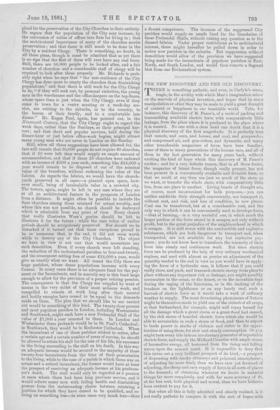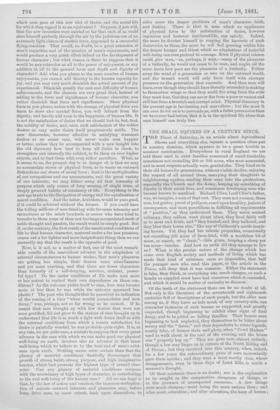THE NEW DISCOVERY AND THE OLD DISCOVERY.
THERE is something pathetic, and even, in Carlyle's sense, tragic, in the avidity with which Man's imagination seizes on the marvels of physical invention, and hopes that by some manipulation or other they may be made to yield a great draught of content or happiness to our insatiable world. Take, for instance, this discovery of M. Faure's, of a mode of packing and transmitting available electric force with comparatively little leakage, from the place where it is produced to the place where it is wanted. No one with a clear head can doubt that it is a physical discovery of the first magnitude. It is perfectly true that camels, and oxen, and horses, and coal, and gunpowder, and compressed air, and gun-cotton, and dynamite, and many other transferable magazines of force, have been familiar, some of them to many generations of the human race, and all of them to the last generation for many years back, without exciting the kind of hope which this discovery of M. Faure's. excites ; and for a very definite reason, that in all these forms, the magazine of latent force, though really present, has not been present in a conveniently available and divisible form, so that we could at any time use just as much of the store as we want, or transfer the whole store, with comparatively little loss, from one place to another. Living beasts of draught are, of course, most inconvenient for both purposes,—you can. neither subdivide their strength conveniently, nor transport it, without cost, and risk, and loss of condition, to new places. Coal can be transferred, but at a considerable cost, and the only way in which it can be conveniently used to clevelope force, —that of burning,—is a very wasteful one, in which much the larger portion of the force stored in it escapes, not only without profit, but to the great prejudice of the neighbourhood in which it escapes. It is still worse with the combustible and explosive substances, which are both dangerous to transport and, when transported, are not available for any but explosive pur- poses; you do not know how to transform the intensity of their force into steady and continuous work. But since electric force can be produced by the help of very ordinary mechanical engines, and used with almost as precise an. adjustment of the quantity needed to the end in view as you would have in apply- ing the force of a hydraulic ram, it follows that if you could really store, and pack, and transmit electric energy from place to place without any important risk or leakage, you might possibly accumulate in the ocean, or the desert, or on the mountain-tops during the raging of the hurricane, or in the dashing of the breakers on the lighthouse or on any lonely reef, such a harvest of electric force as it would take a week of ordinary weather to supply. The most devastating phenomena of Nature might be themselves made to yield one of the richest of all crepr,. so that Switzerland, for example, might well repay herself for all the damage which a great storm or a great flood had caused, by the rich stores of hoarded electric force which she would be able to accumulate in such a storm or flood, and then to export to lands poorer in stocks of violence and richer in the oppor- tunities of using them, for slow and steady consumption. Or you might turn every tide into an involuntary generator of exportable electric force, and supply the Midland Counties with ample stores of locomotive energy, all borrowed from the rising and falling waves upon the nearest coast. It is impossible to deny that this opens out a very brilliant prospect of its kind,—a prospect of dispensing with smoky chimneys and poisoned atmospheres ; of adjusting far more finely than we have ever yet dreamed of adjusting, the cheap and easy supply of force in all sorts of places to the demand ; of obtaining whatever we desire in material things far more completely, and with far more accuracy of fit, at far less cost, both physical and moral, than we have hitherto been content to pay for it.
But when all this is fully admitted and clearly realised, is it not really pathetic to compare it with the sort of hopes with
which men gaze at this new idol of theirs, and the moral life for which they regard it as an equivalent P Suppose, if you will, that the new invention were carried so far that each of us could steer himself perfectly through the air by the judicious use of an extremely light cistern of electric force, appended to a successful flying-machine. That would, no doubt, be a great extension of men's capacities and of the number of men's enjoyments, and would produce a very great effect indeed on the development of human character ; but what reason is there to suppose that it would be any extension at all to the power of enjoyment, or any addition at all to the general force and depth and dignity of character? Add what you please to the mere number of human enjoyments, you cannot add thereby to the human capacity for joy, and you may very much diminish the actual amount of joy experienced. Diminish greatly the cost and difficulty of human achievements, and the chances are very great that, instead of adding to the force and significance of human character, you rather diminish that force and significance. Store physical force as you please, unless with the storage of physical force you learn to store also mental force, you will detract from the dignity, and hardly add even to the happiness, of human life. It is not the satisfaction of desire that we should look to, but, first, the nobility of desire, and, next, such satisfaction of the nobler desires as may make desire itself progressively noble. The new discoveries, however effective in satisfying transient desires at an easier rate, will never make men happier or better, unless they be accompanied with a new insight into the old discovery how best to keep all desire in cheek, to strengthen and intensify the noblest, to fix them on ever higher objects, and to feed them with even richer sacrifices. What, as it seems to us, the present day is in danger of, is that we may so accumulate stores of physical force, as to waste on outward distractions our stores of moral force ; that in the multiplication of our occupations and our amusements, and the great variety of our interests, we may fritter away all that intensity of purpose which only comes of long musing, of single aims, of deeply grooved habits, of constancy of life. Everything in the new age tends to the dissipation of energy and the equalisation of moral condition. And the latter, doubtless, would be pure good, if it could be achieved without the former. If you could have the toiling millions of men thinking with the same intensity and earnestness as the select hundreds or scores who have tried to transfer to them some of their not too large accumulated stock of noble thought and passion, the result would be simply good. But if, on the contrary, the first result of the ameliorated conditions of life be that human character, matured under a far less pressure, comes out a far lighter and more insignificant thing, then we can assuredly say that the result is the opposite of good.
Now, is it not, as a matter of fact, one of the most remark- able results of the marvellous advance in the adaptation of external circumstances to human wishes, that men's pleasures are getting less simple, their desires more miscellaneous and yet more exacting, and that there are fewer characters than formerly of a self-denying, nervous, reticent, power- ful type ? Do the easier conditions of life make men more or less potent to control their own dependence on those con- ditions? As the universe yields itself to man, does man become more or less than he was while the universe appeared less plastic The poet who thought that he perceived an indication of the coming of a time "when wealth accumulates and men decay," was, perhaps, not so far wrong as he seemed. If he meant that men brought up with few desires that were not soon gratified, did not grow. th the stature of men brought up to understand that life is as much a fight with desire itself as with the external conditions from which a scanty satisfaction for desire is painfully wrested, he was probably quite right. It is, at any rate, we are quite sure, a mistake to suppose that every great advance in the ease with which we can make good our phyeical well-being on earth, involves also an advance in that inner well-being which we believe to be the true end of man's exist- ence upon earth. Nothing seems more certain than that the pliancy of material conditions decidedly discourages that growth of strong habit, strong purpose, and high imaginative
tension, which best promote the highest typo of inward char:. actor. Can any pliancy of material conditions compare
with the ascendancy of high typos of character, in contributing to the real well-being of the human race P All we can hope is that, by the law of action and reaction, the immense multiplica- tion of minute outward interests and pleasures may, before long, drive men, to some extent, back upon themselves, to solve anew the deeper problems of man's character, faith, and destiny. There is that in man which no appliances of physical force to the satisfaction of desire, however ingenious and however inexhaustible, can satisfy. Indeed, the more he devotes himself to reaping the harvests of such discoveries as these, the more he will feel growing within hint the deeper hunger and thirst which no adaptations of material well-being can oven pretend to assuage. Even if physical science could give man,—as, perhaps, it may,—many of the pleasures of a butterfly, he would not cease to be man, and might all the more learn how poor are the pleasures of a butterfly. Fritter away the mind of a generation or two on the outward world, and the inward world will only force itself with stronger pressure on the generation that succeeds. And then men will learn, even though they should have literally succeeded in making to themselves wings so that they could flee away front the evils they most fear, that they can never flee from a poor or vacant and still less from a feverish and corrupt mind. Physical discovery in the present age is fascinating and marvellous ; but the most it can ever do for us is to persuade us, with a fuller persuasion than' we have ever had before, that it is in the spiritual life alone that man himself can truly live.

































 Previous page
Previous page